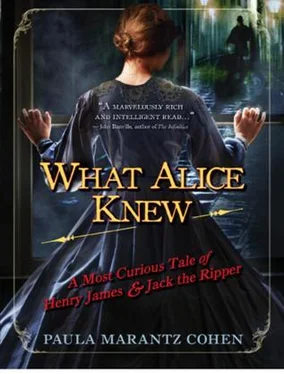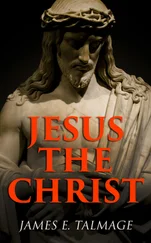“And you see no reason to illuminate him on the matter?”
“No. The work should speak for itself.”
William nodded in agreement and continued to gaze around the room, impressed by the care and method with which Minor had organized his materials. He would have liked to examine some of the bits of paper in the cubbyholes, but Abberline was looking impatient.
Leaving Minor’s room, they climbed the stairs to the floor assigned to prisoners believed to be dangerous. The atmosphere here was different from below—the air hot and stale, and the cells arranged closer together. Sharp, unsettling eyes peered out through some of the barred windows; invectives were hurled at them as they passed, and behind some of the doors, loud shrieks were punctuated by angry, garbled speech. Occasionally guards would enter a cell; there would be a few heavy thuds, and then silence.
“We put Pizer up here,” explained Maudsley, “less because he has proven to be dangerous than to protect him from others. He nodded to Abberline. “As you mentioned, many still hold to the idea that he is Jack the Ripper, though he’s been under lock and key since the second murder. The poor man—and I use the adjective with a certain latitude—is the victim of a kind of thinking that keeps half our population mired in falsity and superstition. They hit on an explanation that supports their prejudices and, despite all proof to the contrary, are unwilling to let it go.”
William nodded. In this, he and Maudsley were in complete accord.
They came to a cell at the end of the corridor. Maudsley knocked and then turned the key. A man of short but powerful build was sitting on the cot in the corner of the room. He had a broad, flat face and a shaven head with small eyes. His lips were closed in a thin, straight line, except when they twitched spasmodically to reveal a set of even yellow teeth. He did not look at the visitors directly. His gaze moved restlessly about the room.
It seemed to William that the man resembled a snake. He had a feverish alertness and a hard, coiled muscularity. He was not a prepossessing-looking individual, but confined to the small space, there was something profoundly vulnerable about him, much as a beast in a cage seems vulnerable in its uncomprehending captivity.
Maudsley introduced the visitors, but Pizer made no acknowledgment. He sat unmoving, only his eyes continuing to dart about the room.
“Perhaps if I could speak with him alone,” suggested William. It occurred to him that the presence of three men, one a police inspector and one the head of a lunatic asylum, was not conducive to intimate chat.
Maudsley considered this request and then nodded. “We’ll wait outside with an ear open in case you need us,” he said, and he and Abberline left the cell.
William sat down on the stool near the bed and addressed the inmate gently. “I want to speak to you about the Whitechapel murders,” he said.
The side of the man’s mouth twitched, but he said nothing.
“I came here in the hope that you might help us find the man responsible.”
Pizer’s eyes darted up for a moment.
William continued. “You were called Leather Apron and suspected of these crimes yourself. Could you tell me why?”
“Bloody sows’ll say anything,” Pizer burst out in a guttural accent.
“You are referring to…?” prompted William.
“Disgusting pigs, the lot of ’em,” Pizer snarled.
William paused. “Is your mother alive?” he finally asked, thinking this might be a way forward.
“Don’ know,” said Pizer morosely.
“Do you remember her?”
Pizer shrugged.
“What about your father?”
“On’y saw the bloody bastard when ’e was drunk and came round t’ beat me.”
“Who raised you?” asked William.
The man gave a shrill laugh. “Bloody pigs raised me.”
“Pigs?”
“Whores. Indentured to whores. I’d kill ’em all if I could.”
“You worked for prostitutes?”
“Washed their chamber pots. Beat me if I didn’t make up their filthy beds. And the gentlemen were worse. Kicked me if they felt like it, bloody, stinkin’ bastards. Saw ’em do filthy things, but they treated me as if I was the one as was dirt.” The man’s eyes darted about the room angrily.
“How old were you when you worked at the brothel?” asked William.
“Who knows? Too young to do nothin’ else.”
William tried to look sympathetic, but the man was so unsavory in his appearance and manner that it was hard to feel sympathy.
“But then I got strong, and they couldn’t do nothin’ more to me,” Pizer continued, having apparently lost his reticence. “I could make ’em do what I said. Jus’ show ’em a knife, and they done it.”
“You carried a knife?”
“’Course I did. Everyone feared Leather Apron.”
“Why were you called Leather Apron?” asked William.
“’Cause I wore a leather apron,” said Pizer with what William had to admit was impeccable logic.
“And why did you wear a leather apron?”
“’Cause I was a boot maker,” said Pizer, as though any moron should know that.
“Did you like your trade?”
“I liked usin’ a knife,” snarled Pizer. “Needed to, to cut the leather. But I’d rather ’ave used it to cut somethin’ else. That Ripper has it right, there.”
“Did you…know…Jack the Ripper?” William asked, suddenly taken with the idea that the two might be friends. Did demonic killers have friends?
“Didn’t know ’im, though they say as he wrote my name in one of ’is letters.” He noted this with a touch of pride. He then said scornfully, “But I wouldn’t ’ave done it his way, myself. He’s too fancy for me.”
“What do you mean ‘too fancy’?” asked William, intrigued by this comparative notion.
“All that slashin’ and cuttin’ up. I likes my knife,” growled Pizer, “but I use it spare. Ain’t that the point of a knife?” His eyes darted up at William in stating this professional view of the matter.
“So you feel Jack the Ripper cuts more than is necessary?”
Pizer snorted. “Don’t need to be fancy to cut shoes. Nor throats neither. Cut ’em clean and simple, I say.”
William pondered the idea a moment. What did that signify, to cut more than was necessary? There was something to be said for Pizer’s observation that the point of using a knife was to be economical in the realm of killing. But then, it wasn’t to kill these women that Jack the Ripper had cut them; they were dead when most of the cutting happened. Why, then, the need to cut more, to be “fancy,” as Pizer put it? Pizer had learned to cut sparingly in his trade as a boot maker. Even a surgeon was economical in his use of a knife. Under what circumstances, then, would fancy cutting be appropriate? He was back to the idea that the key to understanding a madman was to find the context in which his madness made sense, became, that is, perversely rational.
Pizer had resumed talking. “Not as I need a knife to do ’em harm,” he boasted. “I could use these.” He flexed his blunt fingers. “Did it once too.”
“You strangled someone?” There had been suspicion among the people of Whitechapel that Pizer was a killer, but no proof of it, as far as William knew.
Pizer did not respond to the question but snarled, “Can’t treat me like a dog! Cleanin’ up their messes, smellin’ their stench, emptyin’ their piss, makin’ me do filthy things so they could laugh at me.”
The man had again returned to the scene of his childhood, and William suddenly had a vivid image of the boy forced to perform all manner of ungodly acts for the amusement of his employers. But what had prompted him to kill later in life? “The person you strangled,” he pressed. “Why did you do it?”
Читать дальше












